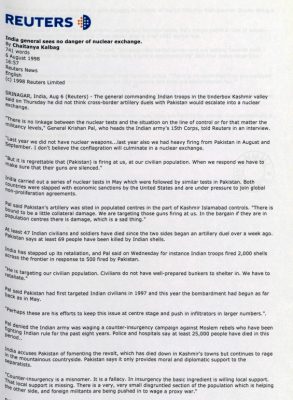India general sees no danger of nuclear exchange
[Reuters]
Published date: 7th Aug 1998
6 August 1998
Reuters News
English
(c) 1998 Reuters Limited
SRINAGAR, India, Aug 6 (Reuters) – The general commanding Indian troops in the tinderbox Kashmir valley said on Thursday he did not think cross-border artillery duels with Pakistan would escalate into a nuclear exchange.
There is no linkage between the nuclear tests and the situation on the line of control or for that matter the militancy levels,” General Krishan Pal, who heads the Indian army’s 15th Corps, told Reuters In an Interview.
Last year we did not have nuclear weapons … last year also we had heavy firing from Pakistan in August and September. I don’t believe the conflagration will culminate In a nuclear exchange.
But it is regrettable that (Pakistan) is firing at us, at our civilian population. When we respond we have to make sure that their guns are silenced.”
India carried out a series of nuclear tests in May which were followed by similar tests in Pakistan, Both countries were slapped with economic sanctions by the United States and are under pressure to join global non-proliferation agreements.
Pal said Pakistan’s artillery was sited in populated centres in the part of Kashmir Islamabad controls. “There is bound to be a little collateral damage. We are targeting those guns firing at us. In the bargain if they are in Population centres there is damage, which is a sad thing.”
At least 47 Indian civilians and soldiers have died since the two sides began an artillery duel over a week ago.
Pakistan says at least 69 people have been killed by Indian shells.
India has stepped up its retaliation, and Pal said on Wednesday for instance Indian troops fired 2,000 shells across the frontier in response to 500 fired by Pakistan.
He is targeting our civilian population. Civilians do not have well-prepared bunkers to shelter in. We have to retaliate.”
Pal said Pakistan had first targeted Indian civilians in 1997 and this year the bombardment had begun as far back as In May.
Perhaps these are his efforts to keep this issue at centre stage and push in infiltrators in larger numbers.”. Pal denied the Indian army was waging a counter-insurgency campaign against Moslem rebels who have been nighting Indian rule for the past eight years. Police and hospitals say at least 25,000 people have died in this period ..
India accuses Pakistan of fomenting the revolt, which has died down In Kashmir’s towns but continues to rage in the mountainous countryside. Pakistan says it only provides moral and diplomatic support to the separatists.
Counter-insurgency is a misnomer. It is a fallacy. In Insurgency the basic ingredient is willing local support. That local support is missing. There is a very, very small disgruntled section of the population which is helping the other side, and foreign militants are being pushed in to wage a proxy war.”
“al, who has won a reputation for concern for the welfare of the Indian “jawan”, or foot soldier, commands 150,000 men and is responsible for possibly the world’s most treacherous frontier.
nis troops stand eyeball to eyeball with Pakistan’s army along a 550-km (340-mile) “line of control” slicing through Kashmir, and are locked in a grim struggle for control of the 20,000-foot high Siachen Glacier along a 60-km “actual ground position line”.
In the northeast of the cock’s-comb shaped Jammu and Kashmir state, Pal’s troops patrol a “line of actual control” In the Aksai Chin region that China seized after a brief 1962 border war.
“It is the largest corps in the world,” Pal said. “We have very varied terrain and are looking towards both Pakistan and China. Fortunately with China we have a “peace and tranquillity’ pact that keeps Aksai Chin peaceful.”
Pal said the Moslem rebels usually outgunned local Kashmir police. “There is no doubt that they are equipped with state-of-the-art communication equipment and weapons and they are better-trained too.”
He said the foreign guerrillas were mainly Pakistani Punjabis. “We have caught even some serving and former Pakistani soldiers who are assisting these people in sabotage and disruptive operations.
But their dedication and commitment is nowhere near ours. They are fighting for money. Our commitment is to defend our nation. Our army is better-trained and better-led, they have no hope of success at all.”






